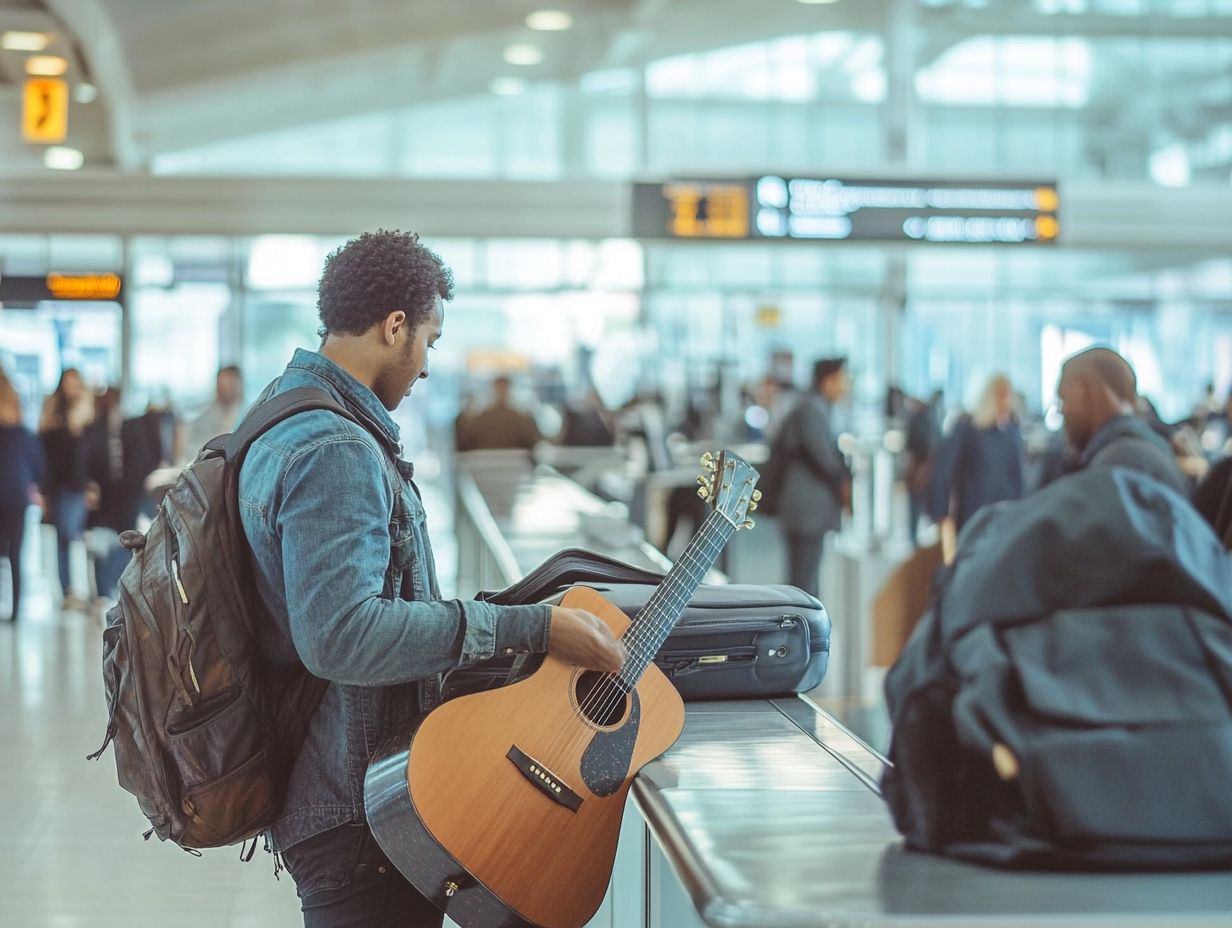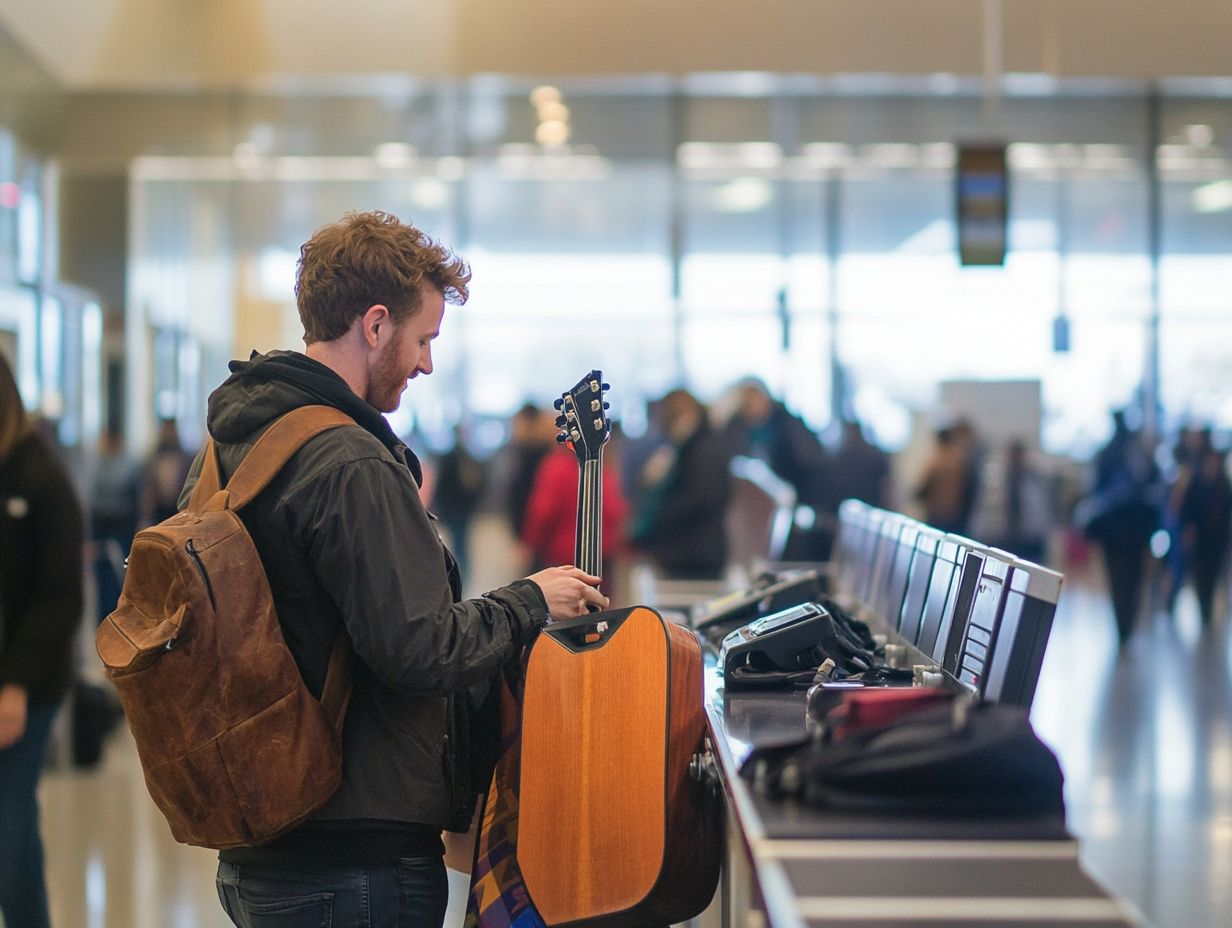Traveling with a guitar can be both exciting and challenging. Whether you are a musician heading to a gig or a passionate hobbyist on vacation, it is essential to understand airline policies and prepare adequately for a smooth journey. This guide covers everything you need to know about bringing your guitar on a plane, including navigating airline rules, packing tips, essential travel documents, and alternatives like renting or shipping your instrument. Additionally, we provide strategies for successfully getting through airport security with your guitar intact, handling TSA regulations, and managing size limits. Get ready to travel with confidence, maintain your musical performance, and keep your music alive on the go!
Rules and Regulations for Bringing a Guitar on a Plane

Airline regulations for traveling with a guitar can vary significantly between different airlines and their routes, making it essential to be aware of the specific rules and regulations for your chosen carrier. Understanding carry-on policies, size limits, and weight restrictions is crucial for a hassle-free experience.
Understanding airline policies regarding musical instruments is crucial for ensuring that you can travel safely and without incurring airline fees.
Key factors to consider include TSA regulations, size restrictions, and checked baggage policies, all of which play a role in determining how you can transport your instrument safely without facing additional charges or complications at the airport, such as during the ticketing and boarding process.
Overview of Airline Policies
Airline policies regarding the transportation of musical instruments, such as guitars, can vary significantly between domestic and international flights. This inconsistency requires traveling musicians to carefully research the specific regulations of their airline beforehand by checking airline websites or consulting with customer service.
Some airlines permit guitars in the cabin as a carry-on, while others mandate that they be checked as fragile items. Familiarizing oneself with these policies can help avoid unexpected airline fees or travel delays.
For instance, airlines like Delta and American Airlines generally allow full-sized guitars in the cabin, provided they comply with the carry-on size regulations. Conversely, low-cost carriers tend to have more stringent rules, leaving musicians to navigate the complexities of checked baggage allowances and instrument storage.
When flying internationally, musicians should also be aware of the varying regulations imposed by different countries regarding the importation of musical instruments. To protect their instruments and comply with airline regulations for fragile items, musicians may want to invest in a sturdy instrument case.
Tips for Traveling with a Guitar

Traveling with a guitar can be rewarding for musicians, but it also comes with its challenges. However, these challenges can be minimized with careful packing and preparation for the trip, including understanding travel tips and regulations.
Utilizing travel-friendly gear, such as a padded soft case or a durable hard case, can help protect your instrument from the rigors of air travel, ensuring it arrives safely and in tune. Being aware of your airline’s luggage allowance and travel policies, as well as your rights as a passenger, can lead to a smoother boarding experience.
Musicians should plan ahead and create a travel checklist of necessary items to avoid last-minute issues. Essential items to include are:
- tuners
- spare strings
- a comfortable strap
- a capo
Opt for lightweight, versatile accessories that won’t take up much space, such as collapsible stands and portable pedals. When booking accommodations, look for musician-friendly places that provide a private area for practice and instrument maintenance.
It’s also important to have a written plan for keeping your instrument secure during transit, whether that involves using a tracking device or simply carrying it onto the plane with you as a personal item.
Preparing Your Guitar for Travel
Preparing a guitar for travel necessitates careful packing and protective measures to safeguard the instrument against potential damage during transit. Musicians should invest in a high-quality guitar case, whether a soft case or a hard case, to ensure their instrument receives proper support and cushioning, particularly when traveling as checked baggage on international or domestic flights.
Additionally, understanding the benefits of travel insurance and keeping the guitar as a carry-on are two effective measures that significantly reduce the risk of losing or damaging the instrument during airport security checks and boarding processes. This is especially important during layovers or connection flights.
Packing and Protecting Your Instrument

When packing your guitar for air travel, the choice of case is the most important factor affecting the instrument’s safety and sound quality. A high-quality hard case is the preferred option because it is more resistant to damage and offers better cushioning against the shocks and impacts that a bag may encounter during transit, compared to a soft case. This choice is important for maintaining sound equipment and musical performance.
While a soft case is more convenient for travel, especially for carry-on, it is more vulnerable to damage and requires extra caution during airport procedures like security screening and boarding.
Plus selecting the right case, musicians should take steps to secure loose parts, protect the neck and body, and prevent damage in various other ways. This includes lowering the instrument’s action or adjusting the strings to decrease tension, which helps prevent breakage while traveling. Such instrument care is crucial for touring musicians.
When deciding between hard and soft cases, musicians should also consider the impact on sound quality. Ultimately, the right packing process can be the difference between a damaged instrument and one that is ready for a gig, rehearsal, or performance after travel.
Important Documents to Bring
When traveling with a guitar, especially on international flights, it is essential to have the proper travel documents. These include your airline ticket, any necessary identification, and travel insurance documentation if you wish to cover your instrument. Checking airline policies and travel regulations in advance can also save time.
Having these documents in order will help you navigate customs, security checkpoints, and boarding without complications. Additionally, musicians should carry a copy of the instrument’s purchase receipt, as it may be useful in proving ownership during customs checks, especially if traveling with expensive sound equipment.
If you plan to perform or conduct business in certain countries, a musician’s visa may be required, so it is advisable to arrange this well in advance with the help of a musicians’ community or travel support services.
Researching the customs regulations of your destination country can help you avoid unwanted delays. Furthermore, having a printed itinerary can aid in organization and provide quick access to essential information, including performance venues and rehearsals.
By preparing the right travel documents, you can ensure a smoother journey and focus on your music and musical travel experiences without interruptions.
Alternatives to Bringing a Guitar on a Plane

For musicians who want to avoid the challenges of bringing a guitar on a plane, there are several convenient alternatives that do not compromise their travel experiences or music.
Renting a guitar at your destination and shipping your instrument in advance are two viable options for those traveling to music festivals or events requiring a travel guitar. These alternatives can help alleviate the stress of navigating busy airports with a valuable instrument and ensure travel comfort.
Renting or Shipping a Guitar
Renting or shipping a guitar can be an effective solution for musicians who wish to avoid the complexities of air travel with their instruments. Many music stores and rental companies offer travel guitars that meet a variety of musical needs, including those of percussion and string instruments.
Shipping your guitar directly to your destination can also ensure that it arrives safely and in tune, ready for your next performance, whether it’s a local gig or a larger music festival. This method can also be covered by instrument insurance or instrument warranty.
Understanding the costs associated with these options is essential, as rental fees can vary significantly based on the quality and type of instrument, while shipping costs depend on the distance and the carrier services selected. Availability is another important consideration; travelers should research local rental options or shipping providers well in advance to ensure a seamless experience. Consulting a musicians’ community can provide travel advice and support.
When choosing the best option, musicians should consider their playing style, the genre of music they will perform, and the ease of transport. This tailored approach helps ensure that their musical journey and touring remain enjoyable and stress-free.
Tips for Navigating Airport Security
Traveling with a guitar through airport security can be a complicated experience because of the numerous travel restrictions imposed by the TSA regulations and various airlines.
Musicians can make the process smoother by familiarizing themselves with TSA rules regarding musical instruments and preparing for increased scrutiny from the flight crew, such as the flight attendant and gate agent.
Understanding the procedures in advance can alleviate some stress and decrease the likelihood of an emergency landing or that the instrument will not arrive at its destination in one piece.
Getting Through Security with Your Guitar
Successfully navigating airport security with your guitar requires a thorough understanding of TSA regulations and proper preparation. Musicians often have the option to bring their guitar on board as a personal item, but it is essential to check your airline’s size restrictions and policies to avoid issues at security screening. Properly packing your instrument with luggage tags and considering how it will be presented at the checkpoint will help streamline the process.
To ensure maximum protection, pack your guitar in a hard or padded case before arriving at the airport. It is advisable to inform the TSA officer about your guitar before placing it on the conveyor belt at the security checkpoint, as this clarifies that it is a fragile musical instrument. Be prepared to take your guitar out of its case if requested, as this can facilitate the inspection, especially for acoustic guitar or electric guitar.
Arriving early and allowing extra time for potential delays and routings can significantly reduce travel stress. By planning ahead and giving yourself ample time, you can expect a smoother experience when clearing airport security.
Dealing with Potential Issues
Despite thorough preparation, musicians may still encounter unforeseen challenges. If issues arise, such as damage to the instrument during transit or complications with travel arrangements, it is important to know your rights as a passenger and the recourse available. Contacting customer service promptly can help resolve disputes, and having instrument insurance can provide peace of mind. Engaging with the musicians’ community for advice and support can also be beneficial for navigating unexpected situations.
While traveling with a guitar can present various challenges, such as flight delays or unexpected changes in airline policies, including TSA regulations, there are several steps you can take to protect your instrument and facilitate a smoother journey.
Travel insurance can safeguard you against unforeseen issues, including travel restrictions, and maintaining clear communication and patience with airline employees, like flight attendants or gate agents, can often help resolve problems effectively. Understanding your rights as a passenger is also beneficial in navigating these situations, especially regarding airline fees and regulations.
Musicians should invest in a high-quality hard-shell case to shield their instruments from damage during travel, including checked baggage scenarios. Additionally, it is crucial to familiarize yourself with the specific guitar policies of the airlines you plan to use; these policies may dictate whether instruments can be stored in the cabin as a carry-on and if there are extra fees for oversized baggage, following airline fees and weight restrictions.
Engaging in conversations with fellow travelers or employees at airports, bus stations, or rail stations can provide valuable insights and tips for safe traveling practices, including advice on instrument storage and boarding procedures. By taking these logistics into account, musicians can minimize the likelihood of travel issues and concentrate on their craft, including rehearsal and performance, rather than worrying about potential obstacles during their journeys.



